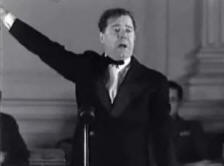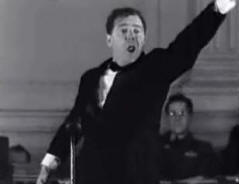-
(单词翻译:双击或拖选)
President Roosevelt was elected on November 8, 1932. People look upon an elected President as the President. This is January 1935. We are in our third year of the Roosevelt depression, with the conditions growing worse...
We must now become awakened1! We must know the truth and speak the truth. There is no use to wait three more years. It is not Roosevelt or ruin; it is Roosevelt’s ruin.
Now, my friends, it makes no difference who is President or who is senator. America is for 125 million people and the unborn to come. We ran Mr. Roosevelt for the president of the United States because he promised to us by word of mouth and in writing:
1. That the size of the big man’s fortune would be reduced so as to give the masses at the bottom enough to wipe out all poverty; and
2. That the hours of labor2 would be so reduced that all would share in the work to be done and in consuming the abundance mankind produced.
Hundreds of words were used by Mr. Roosevelt to make these promises to the people, but they were made over and over again. He reiterated3 these pledges even after he took his oath as President. Summed up, what these promises meant was: “Share our wealth.”
When I saw him spending all his time of ease and recreation with the business partners of Mr. John D. Rockefeller, Jr., with such men as the Astors, etc., maybe I ought to have had better sense than to have believed the would ever break down their big fortunes to give enough to the masses to end poverty--maybe some will think me weak for ever believing it all, but millions of other people were fooled the same as myself. I was like a drowning man grabbing at a straw, I guess. The face and eyes, the hungry forms of mothers and children, the aching hearts of students denied education were before our eyes, and when Roosevelt promised, we jumped for that ray of hope.
So therefore I call upon the men and women of America to immediately join in our work and movement to share our wealth.
There are thousands of share-our-wealth societies organized in the United States now. We want 100,000 such societies formed for every nook and corner of this country--societies that will meet, talk,, and work, all for the purpose tat the great wealth and abundance of this great land that belongs to us may be shared and enjoyed by all of us.
 We have nothing more for which we should ask the Lord. He ahs allowed this land to have too much of everything that humanity needs.
We have nothing more for which we should ask the Lord. He ahs allowed this land to have too much of everything that humanity needs.
So in this land of God’s abundance we propose laws, viz.:
1. The fortunes of the multimillionaires and billionaires shall be reduced so that no one persons shall own more than a few million dollars to the person. We would do this by a capital levy4 tax. On the first million that a man was worth, we would not impose any tax. We would say, “All right for your first million dollars, but after you get that rich you will have to start helping5 the balance of us.” So we would not levy and capital levy tax on the first million one owned. But on the second million a man owns, we would tax that 1 percent, so that every year the man owned the second million dollars he would be taxed $10,000. On the third million we would impose a tax of 2 percent. On the fourth million we would impose a tax of 4 percent. On the fifth million we would impose a tax of 16 percent. On the seventh million we would impose a tax of 32 percent. On the eighth million we would impose a tax of 64 percent ; and on all over the eight million we would impose a tax of 100 percent.
What this would mean is tat the annual tax would bring the biggest fortune down to $3 or $4 million to the person because no one could pay taxes very long in the higher brackets. But $3 or $4 million is enough for any one person and his children and his children’s children. We cannot allow one to have more than that because it would not leave enough for the balance to have something.
2. We propose to limit the amount any one man can earn in one year or inherit to $1 million to the person.
3. Now, by limiting the size of the fortunes and incomes of the big men, we will throw into the government Treasury6 the money and property from which we will care for the millions of people who have nothing; and with this money we ill provide a home and the comforts of home, with such common conveniences as radio and automobile7, for every family in America, free of debt.
4. We guarantee food and clothing and employment for everyone who should work by shortening the hours of labor to thirty hours per week, maybe less, and to eleven months per year, maybe less. We would have the hours shortened just so much as would give work to everybody to produce enough for everybody; and if we wee to get them down to where they were too short, then we would lengthen8 them again. As long as all the people working can produce enough of automobiles9, radios, homes, schools, and theatres for everyone to have that kind of comfort and convenience, then let us all have work to do and have that much of heaven on earth.
5. We would provide education at the expense of the states and the United States for every child, not only through grammar school and high school but through to a college and vocational education. We would simply extend the Louisiana plan to apply to colleges and all people. Yes, we would have to build thousands of more colleges and employ 100,000 more teachers; but we have materials, men, and women who are ready and available for the work. Why have the right to a college education depend upon whether the father or mother is so well-to-do as to send a boy or girl to college? We would give every child the right to education and a living at birth.
6. We would give a pension to all persons above sixty years of age in an amount sufficient to support them in comfortable circumstances, expecting those who earn $1,000 per year or who are worth $10,000.
7. Until we could straighten things out--and we can straighten things out in two months under our program--we would grant a moratorium10 on all debts which people owe that they cannot pay.
And now you have our program, none too big, none too little, but every man a king.
We owe debts in America today, public and private, amounting to $252 billion. That means that every child is born with a $2,000 debt tied around his neck to hold him down before he gets started. Then, on top of that, the wealth is locked in a vise owned by a few people. We propose that children shall be born in a land of opportunity, guaranteed a home, food, clothes, and the other things that make for living, including the right to education.
Our plan would injure no one. It would not stop us from having millionaires--it would increase them ten-fold, because so many more people could make $1 million if they had the chance our plan gives them. our plan would not break up big concerns. The only difference would be that maybe 10,000 people would own a concern instead of 10 people owning it.
But, my friends, unless we do share our wealth, unless we limit the size of the big man so as to give something to the little man, we can never have a happy or free people. God said so! He ordered it.
We have everything our people need. Too much of food, clothes, and houses--why not let all have their fill and lie down in the ease and comfort God has given us? Why not? Because a few own everything--the masses own nothing.
 I wonder if any of you people who are listening to me were ever at a barbecue! We used to go there--sometimes 1,000 people or more. If there were 1,000 people, we would put enough meat and bread and everything else on the table for 1,000 people. Then everybody would be called and everyone would eat all they wanted. But suppose at one of these barbecues for 1,000 people that one man took 90 percent of the food and ran off with it and ate until he got sick and let the balance rot. Then 999 people would have only enough for 100 to eat and there would be many to starve because of the greed of just one person for something he couldn’t eat himself.
I wonder if any of you people who are listening to me were ever at a barbecue! We used to go there--sometimes 1,000 people or more. If there were 1,000 people, we would put enough meat and bread and everything else on the table for 1,000 people. Then everybody would be called and everyone would eat all they wanted. But suppose at one of these barbecues for 1,000 people that one man took 90 percent of the food and ran off with it and ate until he got sick and let the balance rot. Then 999 people would have only enough for 100 to eat and there would be many to starve because of the greed of just one person for something he couldn’t eat himself.
Well, ladies and gentlemen, America all the people of America, have bee invited to a barbecue. God invited us all to come and eat and drink all we wanted. He smiled on our land we grew crops of plenty to eat and wear. He showed us in the earth the iron and other things to make everything we wanted. he unfolded to us the secrets of science so that our work might be easy. God called: “Come to my feast.”
Then what happened? Rockefeller, Morgan, and their crowd stepped up and took enough for 120 million people and left only enough for 5 million for all the other 125 million to eat. And so many million must go hungry and without these good things God gave us unless we call on them to put some of it back.
 收听单词发音
收听单词发音
1
awakened

|
|
| v.(使)醒( awaken的过去式和过去分词 );(使)觉醒;弄醒;(使)意识到 | |
参考例句: |
|
|
|
2
labor

|
|
| n.劳动,努力,工作,劳工;分娩;vi.劳动,努力,苦干;vt.详细分析;麻烦 | |
参考例句: |
|
|
|
3
reiterated

|
|
| 反复地说,重申( reiterate的过去式和过去分词 ) | |
参考例句: |
|
|
|
4
levy

|
|
| n.征收税或其他款项,征收额 | |
参考例句: |
|
|
|
5
helping

|
|
| n.食物的一份&adj.帮助人的,辅助的 | |
参考例句: |
|
|
|
6
treasury

|
|
| n.宝库;国库,金库;文库 | |
参考例句: |
|
|
|
7
automobile

|
|
| n.汽车,机动车 | |
参考例句: |
|
|
|
8
lengthen

|
|
| vt.使伸长,延长 | |
参考例句: |
|
|
|
9
automobiles

|
|
| n.汽车( automobile的名词复数 ) | |
参考例句: |
|
|
|
10
moratorium

|
|
| n.(行动、活动的)暂停(期),延期偿付 | |
参考例句: |
|
|
|

















